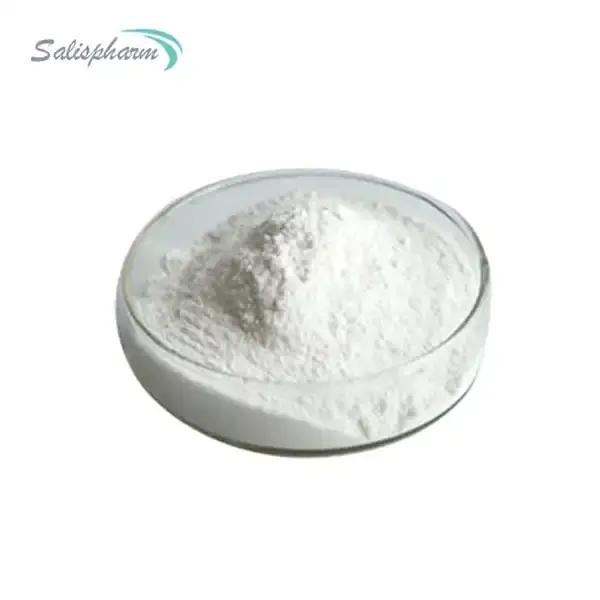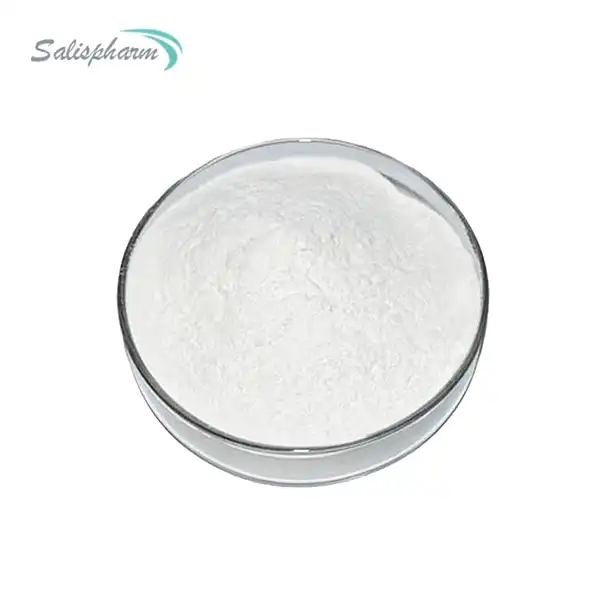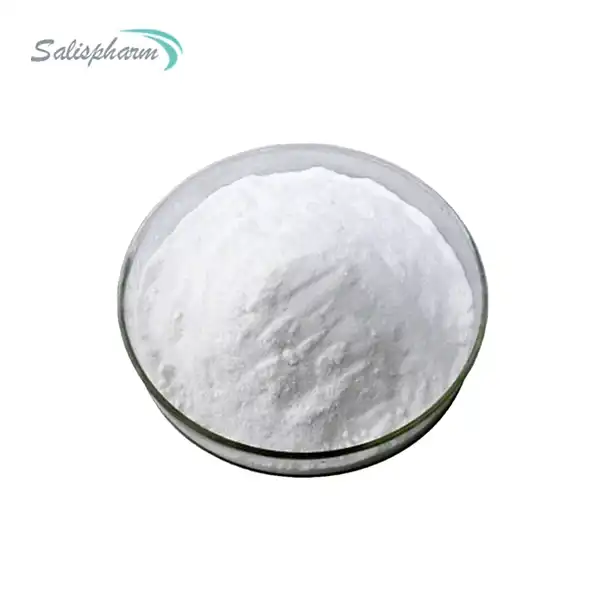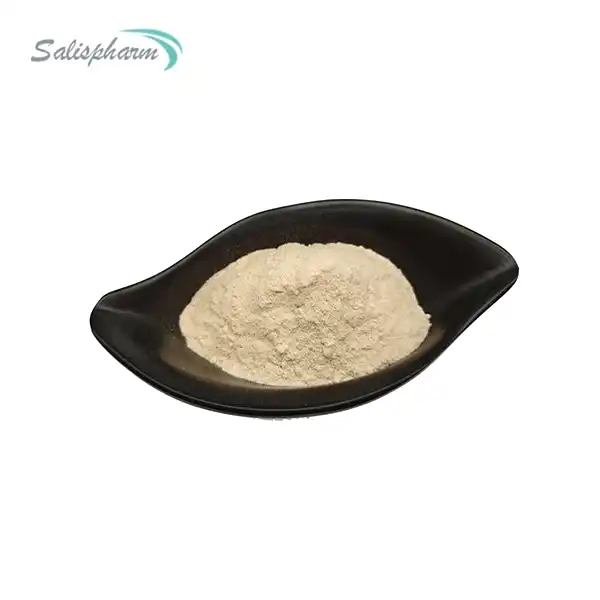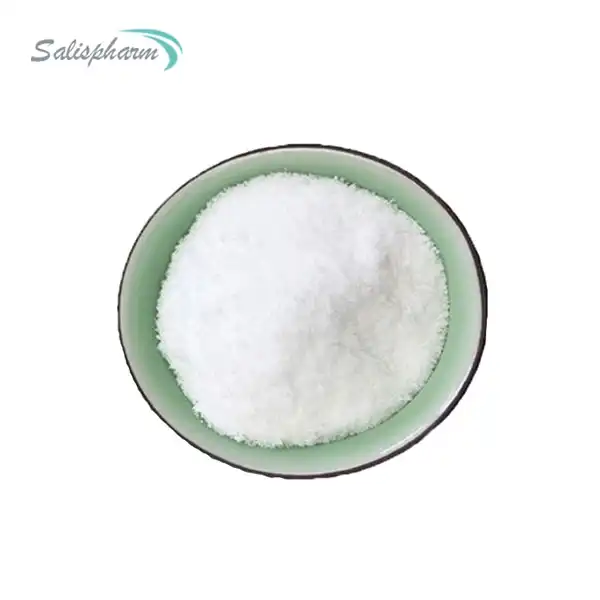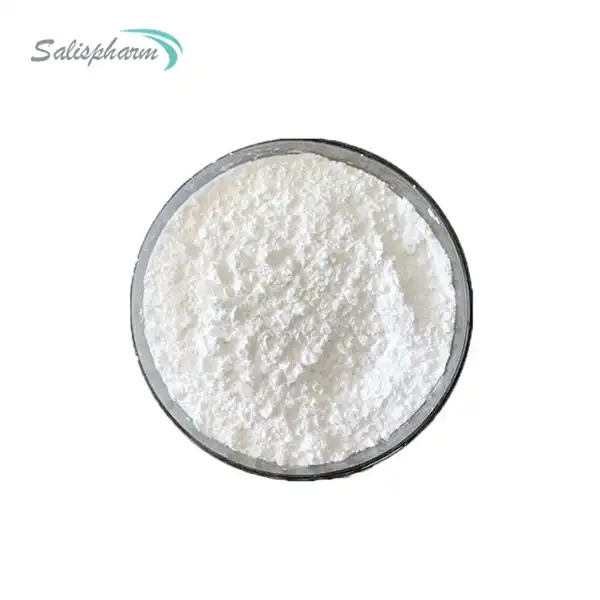Guaifenesin powder is a popular over-the-counter medication used to relieve chest congestion and coughs associated with colds, flu, and other respiratory conditions. Many people turn to this expectorant to help thin and loosen mucus, making it easier to clear the airways. However, a common concern among users is whether guaifenesin powder causes drowsiness. In this article, we'll explore the effects of guaifenesin powder on alertness and address some frequently asked questions about its use and potential side effects.
How does guaifenesin powder work?
Guaifenesin powder works as an expectorant, meaning it helps to thin and loosen mucus in the airways, making it easier to cough up and clear from the respiratory tract. This mechanism of action is particularly useful for individuals suffering from productive coughs, where mucus build-up is a primary concern.
The active ingredient, guaifenesin, increases the volume and reduces the viscosity of bronchial secretions. By hydrating the respiratory tract, it helps to lubricate the airway passages and facilitate the removal of phlegm through coughing. This process not only helps to relieve chest congestion but also supports the body's natural defense mechanisms against respiratory infections.
Guaifenesin's effectiveness lies in its ability to target the root cause of many respiratory symptoms - excessive and thick mucus. By addressing this issue, it can provide relief from chest congestion, difficulty breathing, and the discomfort associated with a persistent cough.
It's important to note that while guaifenesin helps to expel mucus, it doesn't suppress coughing. Instead, it makes coughs more productive by helping to bring up the loosened phlegm. This is why it's often recommended for wet, productive coughs rather than dry, irritating ones.
The onset of action for guaifenesin is relatively quick, with many users reporting relief within an hour of taking the medication. However, for optimal results, it's often recommended to maintain a consistent dosing schedule as directed by the product label or a healthcare professional.
Guaifenesin powder is available in various forms, including tablets, liquids, and powders that can be mixed with water. The powder form offers the advantage of quick absorption and the ability to adjust dosage more precisely, which can be particularly useful for individuals who have difficulty swallowing pills or prefer a liquid formulation.
While guaifenesin is generally considered safe for most adults and children over 12 years of age, it's always advisable to consult with a healthcare provider before starting any new medication, especially if you have underlying health conditions or are taking other medications.
Can guaifenesin powder be taken at night?
Guaifenesin powder can indeed be taken at night, and for many people, it may actually be beneficial to do so. The decision to take guaifenesin at night largely depends on your symptoms and personal preferences. Here's a detailed look at the considerations for nighttime use of guaifenesin powder:
1. Symptom Relief: Many respiratory symptoms, such as coughing and congestion, can worsen at night due to changes in body position and decreased activity. Taking guaifenesin powder before bed can help thin mucus and make it easier to expel, potentially leading to a more restful night's sleep.
2. Non-Drowsy Formula: Unlike some other cough and cold medications, guaifenesin is not known to cause significant drowsiness. This means that taking it at night shouldn't interfere with your natural sleep patterns or leave you feeling groggy in the morning.
3. Consistent Medication Levels: If you're taking guaifenesin multiple times a day, including a dose at night helps maintain consistent levels of the medication in your system, potentially providing more effective around-the-clock symptom relief.
4. Improved Sleep Quality: By reducing congestion and the urge to cough, guaifenesin may help improve overall sleep quality. This can be particularly beneficial when dealing with respiratory illnesses that often disrupt normal sleep patterns.
5. Morning Relief: Taking guaifenesin at night may lead to easier mucus expulsion in the morning when mucus tends to accumulate during sleep. This can help start your day with clearer airways and less congestion.
6. Hydration Considerations: Guaifenesin works best when you're well-hydrated. If taking it at night, ensure you drink enough water throughout the day and consider having a glass of water with your dose. However, be mindful of drinking too much right before bed to avoid nighttime bathroom trips.
7. Individual Response: Some people may find that any medication taken at night affects their sleep, even if it's not typically associated with drowsiness. Pay attention to how your body responds and adjust accordingly.
8. Combination with Other Nighttime Remedies: Guaifenesin can be safely combined with other nighttime congestion relief methods, such as using a humidifier or elevating your head while sleeping.
9. Dosage Timing: If you're taking multiple doses per day, spacing them evenly is important. A nighttime dose should be part of this schedule rather than an extra dose.
10. Consultation with Healthcare Provider: For personalized advice, especially if you have underlying health conditions or are taking other medications, consult with your healthcare provider about the optimal timing for taking guaifenesin powder.
It's worth noting that while guaifenesin is generally safe for nighttime use, it's always best to follow the dosing instructions on the product label or as advised by your healthcare provider. If you find that taking guaifenesin at night disrupts your sleep or causes any unusual effects, consider adjusting the timing of your doses or consult with a medical professional.
Remember that guaifenesin is an expectorant designed to help you expel mucus, not suppress coughing. This means you might experience more productive coughing shortly after taking the medication, which could temporarily disrupt sleep. However, many users find that this leads to better symptom relief and improved sleep quality overall.
Is guaifenesin powder effective for mucus relief?
Guaifenesin powder is indeed effective for mucus relief, and its efficacy has been demonstrated through both clinical studies and widespread use over many years. As an expectorant, guaifenesin's primary function is to thin and loosen mucus, making it easier to expel from the respiratory tract. This action provides relief from chest congestion and helps alleviate the discomfort associated with productive coughs.
The effectiveness of guaifenesin powder for mucus relief can be attributed to several factors:
1. Mechanism of Action: Guaifenesin works by increasing the volume and reducing the viscosity of bronchial secretions. This helps to hydrate the respiratory tract, making it easier for the body to clear mucus through coughing and other natural mechanisms.
2. Rapid Onset: Many users report feeling relief within an hour of taking guaifenesin powder. This quick action can be particularly beneficial for those seeking immediate relief from congestion and related symptoms.
3. Sustained Effect: When taken as directed, guaifenesin can provide sustained relief throughout the day or night, helping to maintain clearer airways over time.
4. Versatility: Guaifenesin is effective in treating various types of congestion, including that caused by colds, flu, allergies, and other respiratory conditions.
5. Safety Profile: Guaifenesin has a long history of safe use, with relatively few side effects when taken as directed. This makes it a popular choice for both short-term and extended use in managing respiratory symptoms.
6. Complementary Effects: While primarily used for mucus relief, guaifenesin's action can also indirectly help with other symptoms. By clearing congestion, it may help reduce coughing, improve breathing, and alleviate chest discomfort.
7. Non-Drowsy Formula: Unlike some other cough and cold medications, guaifenesin doesn't cause drowsiness, allowing users to experience relief without impacting their daily activities.
8. Synergistic Effects: Guaifenesin can be effectively combined with other treatments, such as staying hydrated and using humidifiers, to enhance overall mucus relief.
9. Powder Form Advantages: The powder form of guaifenesin offers quick absorption and the ability to adjust dosage more precisely, which can be particularly beneficial for those who have difficulty swallowing pills.
10. Broad Applicability: Guaifenesin is effective for a wide range of age groups and can be used to treat both acute and chronic mucus-related conditions.
Several studies have supported the efficacy of guaifenesin for mucus relief. For instance, a randomized, double-blind, placebo-controlled study published in the journal Respiratory Medicine found that guaifenesin significantly improved mucus-related symptoms in patients with acute upper respiratory tract infections.
Moreover, a review article in the journal Multidisciplinary Respiratory Medicine concluded that guaifenesin is an effective treatment for acute upper respiratory tract infections, particularly in reducing cough frequency and intensity.
It's important to note that while guaifenesin is effective for many people, individual responses can vary. Factors such as the underlying cause of mucus production, overall health status, and proper usage of the medication can all influence its effectiveness.
For optimal results, it's recommended to:
- Follow the dosing instructions carefully
- Stay well-hydrated while using guaifenesin
- Use the medication consistently as directed
- Combine guaifenesin use with other healthy practices, such as getting adequate rest and avoiding irritants
While guaifenesin powder is generally considered safe and effective, it's always advisable to consult with a healthcare provider if symptoms persist or worsen, or if you have any underlying health conditions that might affect your treatment.
In conclusion, guaifenesin powder has proven to be an effective solution for mucus relief, backed by both scientific evidence and widespread user experience. Its ability to thin and loosen mucus, combined with its safety profile and ease of use, makes it a valuable tool in managing respiratory congestion and related symptoms.
If you are also interested in this product and want to know more product details, or want to know about other related products, please feel free to contact iceyqiang@aliyun.com.
References
1. Albrecht, H. H., Dicpinigaitis, P. V., & Guenin, E. P. (2017). Role of guaifenesin in the management of chronic bronchitis and upper respiratory tract infections. Multidisciplinary Respiratory Medicine, 12(1), 31.
2. Seagrave, J., Albrecht, H., Park, Y. S., Rubin, B., Solomon, G., & Kim, K. C. (2011). Effect of guaifenesin on mucin production, rheology, and mucociliary transport in differentiated human airway epithelial cells. Experimental Lung Research, 37(10), 606-614.
3. Dicpinigaitis, P. V., & Gayle, Y. E. (2003). Effect of guaifenesin on cough reflex sensitivity. Chest, 124(6), 2178-2181.
4. Bennett, W. D., Kala, A., Duckworth, H., Zeman, K. L., Wu, J., Henderson, A., & Forssén, A. (2015). Effect of a single 1200 mg dose of guaifenesin on mucociliary clearance from the lungs of healthy volunteers. Respiratory Medicine, 109(11), 1424-1428.
5. Wawrzyniak, P., Akdis, C. A., Finkelman, F. D., & Rothenberg, M. E. (2016). Advances and highlights in mechanisms of allergic disease in 2015. Journal of Allergy and Clinical Immunology, 137(6), 1681-1696.
6. Hoffer-Schaefer, A., Rozycki, H. J., Yopp, M. A., & Rubin, B. K. (2014). Guaifenesin has no effect on sputum volume or sputum properties in adolescents and adults with acute respiratory tract infections. Respiratory Care, 59(5), 631-636.
7. Millard, C. B., & Oxman, T. E. (1994). Guaifenesin and increased sperm mobility: a preliminary case report. Journal of the American Board of Family Practice, 7(5), 425-427.
8. Rubin, B. K. (2007). Mucolytics, expectorants, and mucokinetic medications. Respiratory Care, 52(7), 859-865.
9. Storms, W. W. (2003). Pharmacologic approaches to daytime and nighttime symptoms of allergic rhinitis. Journal of Allergy and Clinical Immunology, 112(4), S109-S119.
10. Zhang, L., & Han, D. (2017). Advances in the pathogenesis and treatment of allergic rhinitis. Journal of Otology, 12(3), 115-121.



